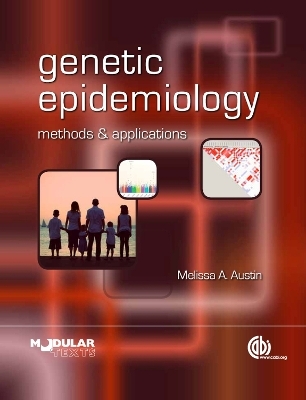
Genetic Epidemiology
Methods and Applications
Seiten
2013
CABI Publishing (Verlag)
978-1-78064-181-2 (ISBN)
CABI Publishing (Verlag)
978-1-78064-181-2 (ISBN)
Following an overview of the field, this textbook reviews key genetic concepts, provides an update on relevant genomic technology, and describes methods for assessing the magnitude of genetic influences on diseases and risk factors. It is an essential resource for graduate students in epidemiology and public health genetics.
Genetic epidemiology plays a key role in discovering genetic factors influencing health and disease, and in understanding how genes and environmental risk factors interact. There is growing interest in this field within public health, with the goal of translating the results into promoting health and preventing disease in both families and populations. This textbook provides graduate students with a working knowledge of genetic epidemiology research methods. Following an overview of the field, the book reviews key genetic concepts, provides an update on relevant genomic technology, including genome-wide chips and DNA sequencing, and describes methods for assessing the magnitude of genetic influences on diseases and risk factors. The book focuses on research study designs for discovering disease susceptibility genes, including family-based linkage analysis, candidate gene and genome-side association studies, assessing gene-environment interactions and epistasis, studies of Non-Mendelian inheritance, and statistical analyses of data from these studies. Specific applications of each research method are illustrated using a variety of diseases and risk factors relevant to public health, and useful web-based genetic analysis software, human reference panels, and repositories, that can greatly facilitate this work, are described. Concluding with a review of ethical issues and a framework for translating human genomics research to clinical practice and public health benefit, this textbook is an essential new resource for graduate students in epidemiology and public health genetics.
Genetic epidemiology plays a key role in discovering genetic factors influencing health and disease, and in understanding how genes and environmental risk factors interact. There is growing interest in this field within public health, with the goal of translating the results into promoting health and preventing disease in both families and populations. This textbook provides graduate students with a working knowledge of genetic epidemiology research methods. Following an overview of the field, the book reviews key genetic concepts, provides an update on relevant genomic technology, including genome-wide chips and DNA sequencing, and describes methods for assessing the magnitude of genetic influences on diseases and risk factors. The book focuses on research study designs for discovering disease susceptibility genes, including family-based linkage analysis, candidate gene and genome-side association studies, assessing gene-environment interactions and epistasis, studies of Non-Mendelian inheritance, and statistical analyses of data from these studies. Specific applications of each research method are illustrated using a variety of diseases and risk factors relevant to public health, and useful web-based genetic analysis software, human reference panels, and repositories, that can greatly facilitate this work, are described. Concluding with a review of ethical issues and a framework for translating human genomics research to clinical practice and public health benefit, this textbook is an essential new resource for graduate students in epidemiology and public health genetics.
Melissa A. Austin teaches at the University of Washington.
a: Foreword 1: The Evolving Field of Genetic Epidemiology 2: Assessing Genetic Influences on Diseases and Risk Factors 3: Genetic Concepts and Genomic Technology for Genetic Epidemiology 4: Family Studies in Genetic Epidemiology: From Linkage to Exome Sequencing 5: Genetic Association Studies 6: Population Stratification in Genetic Association Studies 7: Gene–Environment Interactions and Epistasis 8: Non-Mendelian Genetics 9: Software and Data Resources for Genetic Epidemiology Studies 10: Ethical Issues in Genetic Epidemiology 11: Public Health and Clinical Applications of Genetic Epidemiology
| Co-Autor | Terri Beaty, W Dotson, Kelly Edwards, Stephanie Fullerton |
|---|---|
| Verlagsort | Wallingford |
| Sprache | englisch |
| Maße | 189 x 246 mm |
| Gewicht | 1080 g |
| Themenwelt | Studium ► 2. Studienabschnitt (Klinik) ► Humangenetik |
| Studium ► Querschnittsbereiche ► Epidemiologie / Med. Biometrie | |
| ISBN-10 | 1-78064-181-8 / 1780641818 |
| ISBN-13 | 978-1-78064-181-2 / 9781780641812 |
| Zustand | Neuware |
| Haben Sie eine Frage zum Produkt? |
Mehr entdecken
aus dem Bereich
aus dem Bereich
Eine sehr persönliche Geschichte | Der New York Times-Bestseller
Buch | Softcover (2023)
Ullstein Taschenbuch Verlag
21,99 €
Die revolutionäre Medizin von morgen (Lifespan)
Buch | Softcover (2020)
DuMont Buchverlag
16,00 €


